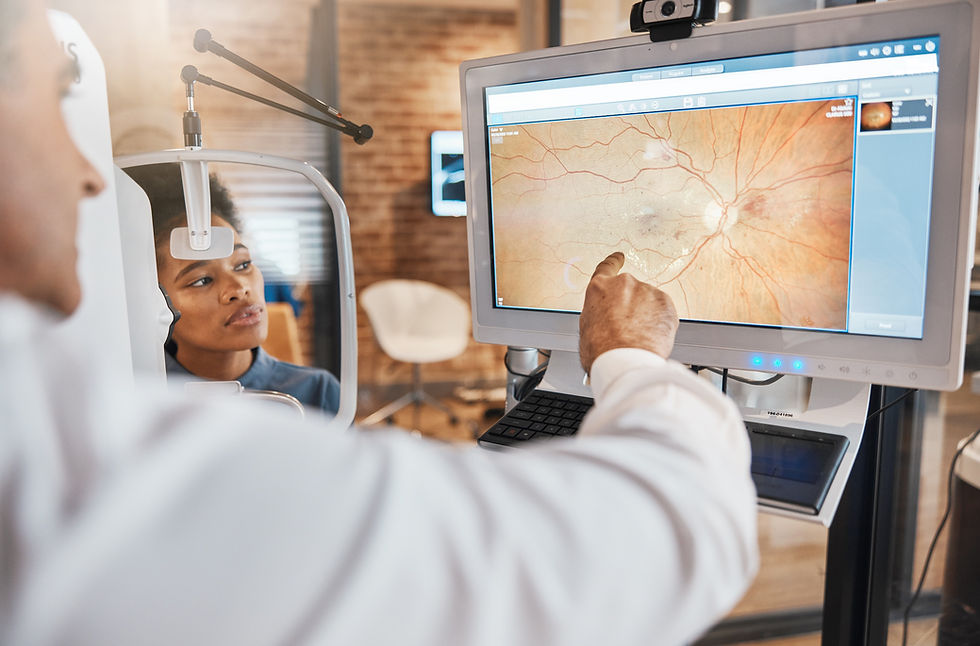Laser Refractive Eye Surgery
- by Dr. Z Aleksic

- Apr 29, 2021
- 4 min read
When it comes to eye procedures, I think the first one that often comes to mind is LASIK, which is Laser Refractive Eye Surgery. For many young people with bad eyesight, they long for a time when they can be spectacle-free, hoping that LASIK will free them from the metaphorical shackles of glasses... Maybe this is a bit dramatic, but still. LASIK is a surgery which many people hope to attain once their eyesight stabilises.
So, what actually is Laser Refractive Eye Surgery? This blog is going to unpack the important questions around this procedure.
1. Is LASIK painful?
No, it is a painless procedure. Better yet, you will not have to worry about any needles coming close to the eye. When you arrive at the hospital, you will be offered what we call a “chill pill.” However this is not going to knock you out. It is simply to take the edge off things This is because, in general, when anyone goes for eye surgery they tend to feel a bit stressed.
You will, however, feel at a point that someone is putting a bit of pressure on the eye with the palm of their hand. That is just when the eye is being marked. Your ophthalmologist will then clean and disinfect the whole eye area and then you will get local anaesthetic drops.
2. How do I keep my eye open during the procedure? Is Laser Eye Surgery safe?
You will not have to worry about keeping your eye open during LASIK. Ophthalmologists use a speculum, which is a little clamp to keep the eye open. The doctor will also cover the eye that is not being operated on. Your doctor can talk you through the whole procedure. When it is done they will clean that area, then put in an antibiotic drop and anti-inflammatory drop. Your ophthalmologist will then close your eye, place a clear shield over it and tape it to your face. Then they will go over to the other eye and do the same procedure.
3. Can LASIK fix astigmatism?
Many people ask me, “which eye surgery is best for astigmatism?” and the answer is, yes, LASIK can fix astigmatism. In fact, both LASIK and PRK correct astigmatism. They are correctable usually up to around a -6 D astigmatism.
4. When is Laser Eye Surgery not suitable?
Being a candidate for LASIK depends majorly on one thing: the size of your cornea in relation to your script. This can be upsetting for many patients who arrive at my rooms excited about their chances of becoming glasses-free by undergoing LASIK.
In your consultation with your ophthalmologist your corneal thickness will be measured. Your eye doctor will measure whether or not you have enough corneal tissue to cater for your prescription.
If, during this consultation, you and your eye doctor discover that your cornea is too thin for your required prescription, you are not a candidate for LASIK. However, there is no need to worry as there are other treatment options which can achieve the same or similar results such as PRK (Photorefractive Keratectomy).
Book a consultation to find out which type of eye surgery is best for you:
5. Are there alternatives to Laser Eye Refractive Surgery?
As mentioned before, PRK is perfect for those who have insufficient cornea sizes, or for people who are very young (< 25-30 years old) or do contact sports. It is done with a brush and medication in order to remove the superficial cells. After the procedure a contact lens is used to allow the cells to grow over for 5- 7 days. There is also a new, break-through PRK technique available at our practice which is a non-touch, bladeless technique which is all done with a laser.
6. When will I be able to notice the results of LASIK?
This is the best part about Laser Refractive Eye Surgery. After 20-25 minutes you will be able to see very well but not perfectly yet. But here is the catch: after your surgery you will be wearing shields to protect you from bumping, scratching or rubbing your eyes, so you will not know how good your new vision is. That being said, you will wear these for only one night.
7. Can I eat normally before LASIK?
On the morning of the surgery you are allowed to eat normally. If you are taking any medications you can continue to take them as usual.
8. What should I wear to Laser Refractive Eye Surgery?
We ask patients to dress comfortably in their own clothes. Dress slightly warmer than usual because we do not want you to feel cold in the theatre.
9. What does Laser Refractive Eye Surgery cost?
We cannot give a standardised price because the cost of eye surgery differs from person to person. It depends on many factors and is determined after your tests are performed.
10. Is Laser Eye Surgery permanent?
There is a yes and no to this question. Yes, the surgery is permanent. But, LASIK surgery does not always mean that you will be glasses-free forever.
What many people do not realise is that LASIK and PRK correct distance, but when age-related reading problems arise around the age of 45, you may still need glasses. This has nothing to do with the laser that you may have had previously.
11. Does my medical aid cover Laser Refractive Eye Surgery?
It all depends on the type of medical aid that you have. We have done an entire YouTube video on this topic:
Link: https://www.youtube.com/watch?v=XaSDT204F2U




Comments